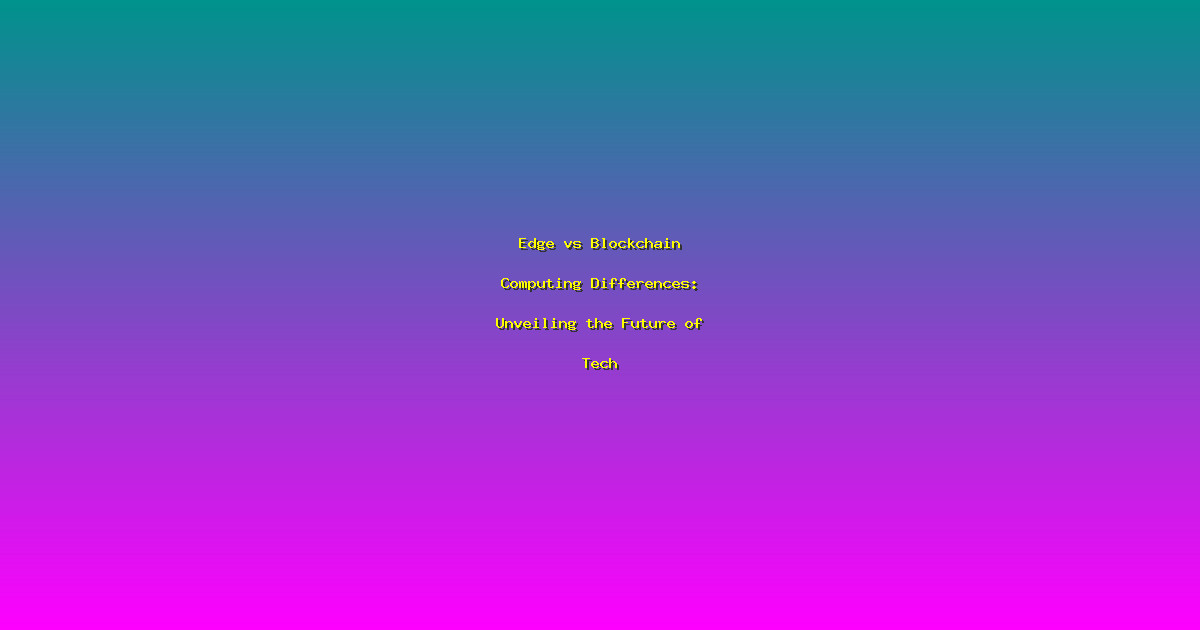Edge vs Blockchain Computing Differences: Unveiling the Future of Tech
Introduction
In the rapidly evolving world of technology, two powerful concepts have emerged as frontrunners in the tech revolution: Edge Computing and Blockchain. While both aim to enhance efficiency and security in data handling, they approach these goals from different angles. This article explores the key differences between Edge and Blockchain Computing, shedding light on each's unique benefits and potential applications.
Understanding Edge Computing
Edge computing moves data processing closer to the source of data generation, aiming to reduce latency and bandwidth usage. By operating on the “edge” of the network, devices like sensors, smartphones, and other IoT devices process information locally, enhancing real-time decision-making and reducing the load on centralized servers.
Exploring Blockchain Computing
Blockchain Computing, on the other hand, focuses on decentralized data storage and verification, utilizing a distributed ledger technology. This technology ensures transparency and security through cryptographic algorithms, making it particularly valuable in scenarios requiring trustless transactions and immutable record-keeping.
Key Differences
Centralization vs Decentralization
Edge computing operates within a decentralized but not necessarily distributed network architecture, whereas blockchain technology is inherently distributed, eliminating centralized authorities and ensuring data integrity and security through consensus mechanisms.
Use Cases
Edge computing is ideal for applications requiring immediate processing of data, such as autonomous vehicles or real-time analytics. Blockchain, however, is more suited for scenarios involving secure and immutable transaction records, like financial services and supply chain management.
Privacy and Security
While both technologies prioritize security, blockchain offers higher transparency and immutability, making it resistant to data tampering. Edge computing focuses on local data processing, reducing the risk of data breaches by minimizing the transmission of sensitive information over networks.
FAQs
What is the main advantage of Edge Computing over Blockchain?
Edge computing excels in reducing latency and enabling real-time processing, which is crucial for applications requiring immediate responses.
Can Blockchain be used in conjunction with Edge Computing?
Yes, blockchain can be integrated with edge computing to enhance security and data integrity in edge environments, combining the best of both technologies.
Is Edge Computing more secure than Blockchain?
Edge computing is not inherently more secure than blockchain; both have their strengths and are used in different contexts based on security needs.
What industries can benefit most from Edge Computing?
Industries such as automotive, healthcare, and manufacturing can greatly benefit from edge computing due to the need for immediate processing and decision-making.
What are the limitations of Blockchain in comparison to Edge Computing?
Blockchain's slow transaction speeds and high energy consumption are limitations, whereas edge computing is constrained by the capabilities of local hardware and network connectivity.
How do these technologies influence the future of the Internet of Things (IoT)?
Both technologies are pivotal in shaping the future of IoT, with edge computing enabling real-time capabilities and blockchain ensuring secure and transparent data exchange.
Conclusion and Call to Action
As we move deeper into the digital age, the choice between edge and blockchain computing will depend largely on the specific needs of various industries. Whether your application demands real-time processing or secure, immutable data records, understanding these technologies is crucial. Stay informed and explore how each can transform your sector. Join the conversation by sharing your thoughts and stay updated with our latest insights.

